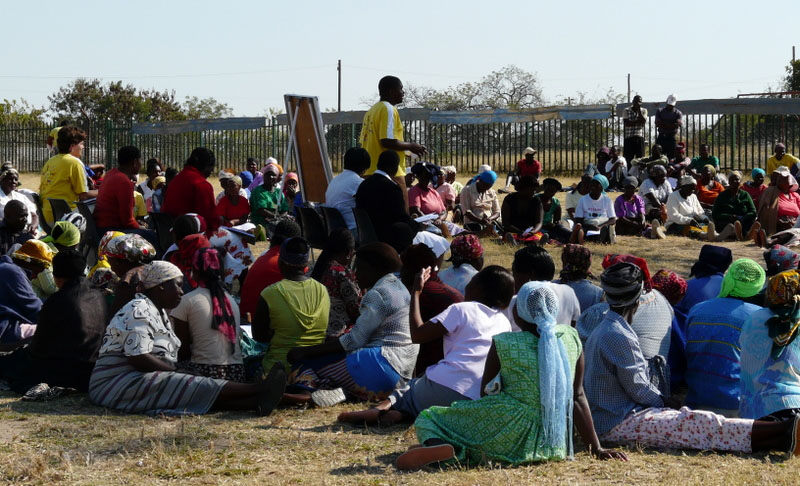Partnering with the people
Sociologist's research assesses public health conditions in South Africa

The initial aim of the Agincourt Health and Socio-Demographic Surveillance System was to assess and improve local health processes in a rural region of northeast South Africa. However, the work done there over the last 27 years has evolved beyond the boundaries of that simple objective.
Since the site launched in 1992 – at the tail end of the nation’s Apartheid era – international teams of researchers and health practitioners have completed hundreds of studies, aiming to improve the lives of Mpumalanga Province residents.
“They worked really hard to be partners so that the people participating in the research do benefit: To improve health systems, to improve the local area, to work on issues like water and sanitation that are still not as developed as they should be, and thinking about environmental factors and how they influence people’s well-being,” said Assistant Professor of Sociology Christie Sennott, who has conducted multiple studies at Agincourt over the last decade.
“It has brought jobs to people that live there,” Sennott continued, “but even beyond that, I think that sort of feeding back the information that they have learned to the community and also using that information to work on local health systems in particular is a very valuable goal and something that’s been very valuable to the community.”
With the help of local research assistants who compile qualitative results through door-to-door surveys, the studies have examined subjects like infectious and non-infectious disease prevalence, elderly health, and infant/maternal mortality rates. They then communicate their findings back to the community, delivering information that could help improve living conditions.
Sennott’s own research has examined gender norms in the context of HIV, young women’s obstacle-laden transition to adulthood in rural South Africa, and the challenges women face when contending with an unplanned pregnancy.
“We found out women who had a premarital birth, which is actually really common – over 40% of young women at the site – were less likely to get married, leading to other potential negative outcomes later on,” said Sennott, who has also conducted studies related to fertility preferences in rural Malawi and in the United States.
For instance, research Sennott conducted at Agincourt with colleagues from the University of Maryland and Brown University indicated that boyfriends in the area often regretted impregnating their girlfriends and refused to claim the child. Abandoned by the child’s father
and living in an area rife with unemployment, the new mother often wound up living with her own mother.
“You can imagine that if this happens to several daughters in the household, that really can have a negative impact on that household’s economic viability,” Sennott said.
Sennott has conducted research with grant support from a variety of sources – including the National Institutes of Health, the Purdue Research Foundation, and the Purdue College of Liberal Arts.
While completing a Ph.D. in sociology from the University of Colorado, Sennott was a doctoral fellow at Agincourt – via a partnership with the University of Witwatersrand in Johannesburg that trains predoctoral and postdoctoral scholars – examining the issues unplanned pregnancy can create for women. She found that 90% of the mothers, particularly the older respondents, did not plan to get pregnant when they did, in part due to a lack of access to family planning clinics and other sources of information.
“Part of the reason that they end up in that situation is that there is not a lot of information about sexual and reproductive health that’s openly shared,” Sennott said, “and so that knowledge about what’s going to happen may only be learned when it happens unfortunately – like when they get pregnant. So long story short, that birth can really make it challenging to continue their education, which obviously limits their prospects for the kind of jobs that most of the women would aspire to.”
Agincourt research has also studied other health concerns in the region, from non-infectious diseases like diabetes and heart disease to the HIV epidemic that exists in Mpumalanga.
“This is an area where HIV is extremely problematic. Prevalence is very, very high,” Sennott said. “By the time men and women both end their reproductive years, prevalence has been as high as 46%. And there’s a gender differential. So it was important to get out information about HIV and get treatment out to folks in the area. That’s one major thing that has been focused on and I think had a really big impact on the community in terms of understanding the extent of the problem and what treatments are available.”
In the end, this is the true value of the Agincourt enterprise, regardless of the area of study. Academic and medical researchers and students come there to learn about rural health systems with the end goal of contributing to a solution. Community members are involved throughout the process, making them active participants as they gain knowledge that can improve their circumstances.
“One of the main things that I love about the site is they have an office of engagement with the community,” Sennott said. “Every research project that’s done is presented to the community ahead of time. You get information from a local community advisement group on best practice with your study and cultural awareness.
“So there’s this front-end investment from the community and when the studies are done, the results of the studies are fed back to the community so they are well aware of what’s happening.”